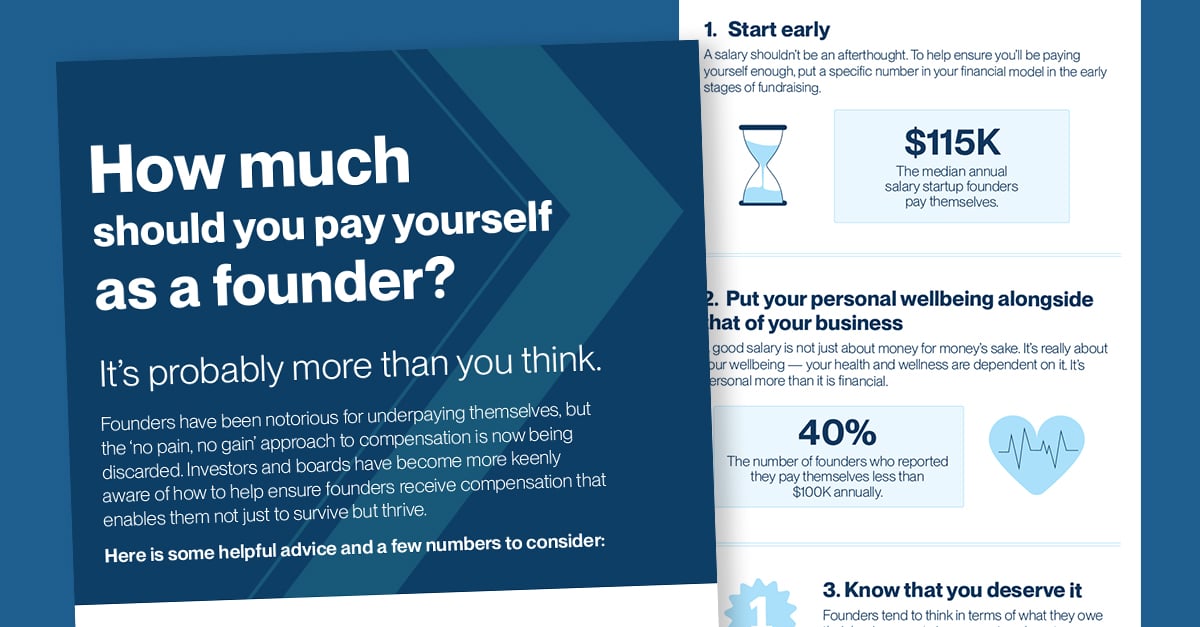Key takeaways
-
When drafted correctly, prenuptial agreements can be used as broad planning tools designed to protect both parties interests.
-
Although many struggle to broach the subject with their partners, prenuptial agreements are fundamental parts of core estate plans for business founders and other wealthy individuals.
-
Too often, busy founders wait to the last minute to begin drafting prenuptial agreements or place assets into trusts which may not offer adequate asset protection.
Podcast transcript
Ann: Welcome to the third episode of "Business Meets Personal Wealth." Hi, I'm Ann Lucchesi with SVB Private, and I've been advising founders for over 20 years on how to think about their wealth journey. Every episode I dig into some of the unique challenges that impact our clients across the innovation economy, and discuss ways our advisors help plan for the unknown and build individual wealth strategies.
Today, I'm joined by my colleague Katie Sheehan, Managing Director with Trust and Fiduciary at SVB Private. Katie, can you share what you do in one sentence?
Katie: Oh, that's tough.
Ann: Yes.
Katie: I am a wealth and fiduciary strategist. So, basically what I do is quarterback the planning process for our clients institution-wide. I am a former practicing trust and estates attorney, so I like to say that what I really do with clients is talk to them about estate planning all day, every day, and everything that comes under that umbrella.
Ann: Well, that sounds complicated and exciting all at the same time. So, today we really wanted to kind of narrow in and talk about why founders should use prenups. I'm just going to come right out and say it. One thing that none of our founders, or anyone for that matter, want to think about is a prenup. I find most of our founders just don't think that it's important to them because they really don't have a lot of money, and they just don't know how to bring it up with their significant other.
Katie, why don't we start with a quick overview of why people, particularly founders, should consider a prenup agreement?
Katie: Sure. Prenuptial and postnuptial, which is simply the same type of agreement that happens after a marriage, is really a key component to any estate plan. And a lot of folks don't always think of it as part of the estate plan, but it certainly should be a key component in a number of circumstances.
Why folks should think about it is, you know, it doesn't have to have the negative connotation that everyone seems to think that it does, which is why they get paralytic when thinking about it or talking about it. But if you house the discussion or the thought process about why you need a prenup into just planning... Right? Planning for the what ifs. What happens if I pass away? What happens if we get divorced? And throw into the mix these are shares, right, of a business, whether they're privately held or public. There are other repercussions that happen with those shares with the distribution of property, whether they can be assigned or sold or part of other contractual agreements.
So, it's really planning for that. And if you house the discussion as a planning mechanism and covering the what ifs and making sure both sides, right, of the agreement are protected and planned for, it's much easier to wrap your head around starting to have that discussion and then bringing it to fruition.
Ann: Yeah, I totally agree with you. It's a complicated thing, but it's so important to think about this beyond just terms of money, which is where I think a lot of people place it.
One of the things I find that a lot of founders think they can do to kind of avoid either this conversation or the need for this is, "Well, what if I just take all of my assets, particularly my shares, and I set up an individual trust and I put all my assets into there? Am I not protected downstream in the event that I have a divorce?"
Katie: You are not protected. So, first of all, it depends on the type of trust, and a lot of times the types of trusts that we're using are revocable, which means they're simply the grantors with a different name. It's going to operate under their social security number. It's 100% reachable by all of their creditors, which could include their spouse in a divorce.
So, there's also the idea of, "Perhaps I can put this in an irrevocable trust," right? But depending on how that is done, how that is drafted, what access and control the grantor has over that, that may not afford any creditor protection either.
And trusts are something that whether... Even if it's irrevocable and seems as iron-clad as it possibly can be, those can be reachable in an awful lot of divorce proceedings. So, a trust is not the asset protection tool that folks think it is. It certainly can be used for that and is, but it's very fact-specific, has to be drafted appropriately for that particular situation. And if it's revocable, which is what most of these folks are thinking, no dice on protection there whatsoever.
Ann: Yeah, and I think that's a really important concept around that. Like, they just think, "Oh, well, it's still my name. I've protected it before we have the agreement."
One of the last issues I'd love to touch on, because I've seen this happen, which is, you know, founders go deep into the game with their significant other, and as they near getting married, they all of a sudden decide, "Okay, now it's time to put a prenup in place. You know, I know I'm going to get married in four days, but let's just put it through." Any thoughts around that?
Katie: Yeah, lots of thoughts. Lots of thoughts, right? So, how these documents are put together and when they're put together is and can be a pretty crucial deciding factor of how legitimate that document's going to be.
So, if you want this document to stand up...which we all do, right? That's why we're entering into it. You have to check off a fair amount of boxes in order for that to work. And one or two of those important boxes that we want to check off. Timing, undue influence, and adequate disclosure.
So, if you're rushing into this... And I would say this actually when I'm talking to any client about putting any legal document together. We never do this in haste, right? Because you can't fully grasp what you're doing if you're doing it at the 11th hour.
And particularly with this, both parties need to have fair and adequate representation, both parties need to agree that they've had fair and adequate disclosure, and both parties need to say that they were not unduly influenced into signing the agreement.
And if you're doing this, you know, three days before the wedding, when you're trying to see if your tux fits, and the cake is coming, and who's fighting with who about the seating arrangement, no, we don't want to be entering into legal agreements then.
Just like I'm telling a lot of clients right now, we don't want to be doing a lot of very complex planning at the end of the year. When the end of the year is fast approaching, we don't want to rush into things because it could compromise the integrity of the planning.
Ann: Well, we've covered a lot in a short period of time. Thank you so much for joining me, Katie. Every episode, I'll be answering the tough questions our clients in the innovation economy have and are looking for solutions to.
If you liked what you heard, subscribe to the "SVB Perspectives Podcast" and get notified when new episodes are published. Thanks for joining. We'll see you here next time on "Business Meets Personal Wealth."















